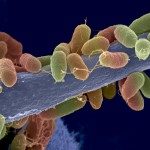Lien vers Pubmed [PMID] – 20852022
Eukaryotic Cell 2010 Nov;9(11):1650-60
In yeast, enzymes with β-glucanase activity are thought to be necessary in morphogenetic events that require controlled hydrolysis of the cell wall. Comparison of the sequence of the Saccharomyces cerevisiae exo-β(1,3)-glucanase Exg1 with the Schizosaccharomyces pombe genome allowed the identification of three genes that were named exg1(+) (locus SPBC1105.05), exg2(+) (SPAC12B10.11), and exg3(+) (SPBC2D10.05). The three proteins have different localizations: Exg1 is secreted to the periplasmic space, Exg2 is a membrane protein, and Exg3 is a cytoplasmic protein. Characterization of the biochemical activity of the proteins indicated that Exg1 and Exg3 are active only against β(1,6)-glucans while no activity was detected for Exg2. Interestingly, Exg1 cleaves the glucans with an endohydrolytic mode of action. exg1(+) showed periodic expression during the cell cycle, with a maximum coinciding with the septation process, and its expression was dependent on the transcription factor Sep1. The Exg1 protein localizes to the septum region in a pattern that was different from that of the endo-β(1,3)-glucanase Eng1. Overexpression of Exg2 resulted in an increase in cell wall material at the poles and in the septum, but the putative catalytic activity of the protein was not required for this effect.

